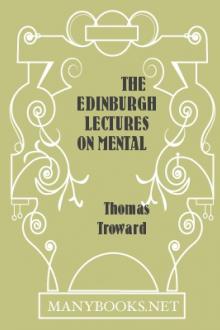London Lectures of 1907 - Annie Besant (white hot kiss TXT) 📗

- Author: Annie Besant
Book online «London Lectures of 1907 - Annie Besant (white hot kiss TXT) 📗». Author Annie Besant
And it may be that if the world grows more spiritual, it may be that if Spirit again becomes triumphant over matter, after passing through the darkness which was necessary in order that the intellect might be thoroughly developed and might learn its powers and its limitations; it may be that, in days to come, when the world is more spiritualised than to-day, climbing as it is again the upward arc, these living Masters of the world's religions will come amongst us again visibly as in the earlier days. It is not They who keep back in silence. It is we who shut Them out, and make Their presence a danger rather than an encouragement and an inspiration. And every one of you--no matter what your faith may be, Christian, Hinḍu, Buḍḍhist, Theosophist, what matters it?--every one of you who makes the Master of your own faith a living reality, part of your life, nearer than friend and brother, every such believer and worker is hastening the day of joy when the world shall be ready for the open reception of the Masters, that They may move visibly amongst humanity once more. That it may be so, open your heart to every breath of truth; that it may be so, open your eyes to every ray from the one eternal Sun. In the past the world would have none of the Masters. They slew the Christ; they made the prophets outcasts. And until in our heart the love of the Master awakens, until with passionate longing, with continual insistence, we call to the divine Men the welcome, without which They may not come, They must remain hidden. Only when there comes up from heart after heart one vast chant of devotion and appeal, only then will They come to the many as They have already come to the few, and show out the visible splendor of Their manhood, as the glory of Their divinity has ever been upon the earth.
Theosophy and the Theosophical Society
I want to put before you clearly and plainly what Theosophy means, and what is the function of the Theosophical Society. For we notice very often, especially with regard to the Society, that there is a good deal of misconception touching it, and that people do not realise the object with which it exists, the work that it is intended to perform. It is very often looked upon as the expression of some new religion, as though people in becoming Theosophists must leave the religious community to which he or she may happen to belong. And so a profound misconception arises, and many people imagine that in some way or other it is hostile to the religion which they profess. Now Theosophy, looked at historically or practically, belongs to all the religions of the world, and every religion has an equal claim to it, has an equal right to say that Theosophy exists within it. For Theosophy, as the name implies, the Divine WISDOM, the WISDOM of God, clearly cannot be appropriated by any body of people, by any Society, not even by the greatest of the religions of the world. It is a common property, as free to everyone as the sunlight and the air. No one can claim it as his, save by virtue of his common humanity; no one can deny it to his brother, save at the peril of destroying his own claim thereto. Now the meaning of this word, both historically and practically, the WISDOM, the Divine WISDOM, is a very definite and clear meaning; it asserts the possibility of the knowledge of God. That is the point that the student ought to grasp; this knowledge of God, not the belief in Him, not the faith in Him, not only vague idea concerning Him, but the _knowledge_ of Him, is possible to man. That is the affirmation of Theosophy, that is its root-meaning and its essence.
And we find, looking back historically, that this has been asserted in the various great religions of the world. They all claim that man can know, not only that man can believe. Only in some of the more modern faiths, in their own modern days, the knowledge has slipped into the background, and the belief, the faith, looms very large in the mind of the believer. Go back as far as you will in the history of the past, and you will find the most ancient of religions affirming this possibility of knowledge. In India, for instance, with its antique civilisation, you find that the very central idea of Hinḍuism is this supreme knowledge, the knowledge of God. As I pointed out to you the other day with regard to this old Eastern religion, all knowledge is regarded in a higher or a lower degree as the knowledge of God; for there is no division, as you know, in that ancient faith, between the secular and the sacred. That division is a modern division, and was unknown in the ancient world. But they did make a division in knowledge between the higher and the lower; and the lower knowledge, or the lower science, called the "lower divine science," was that which you will call "science" nowadays, the study of the external world. But it also included all that here we speak of as Literature, as Art, as Craft--everything, in fact, which the human brain can study and the human fingers can accomplish--the whole of that, in one grand generalisation, was called "Divine Wisdom," but it was the lower divine Wisdom, the inferior knowledge of God. Then, beside, or rather above that, came





Comments (0)